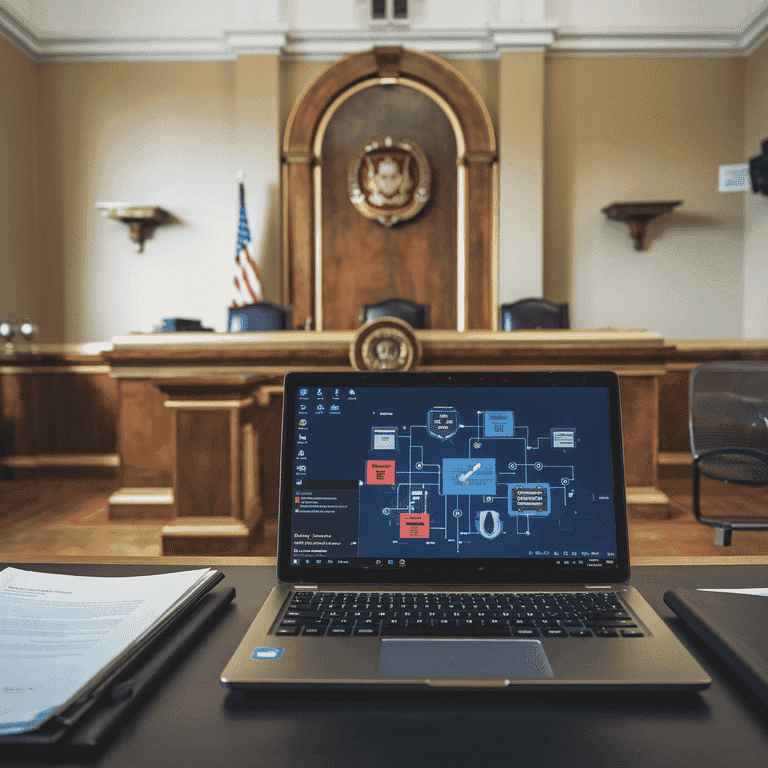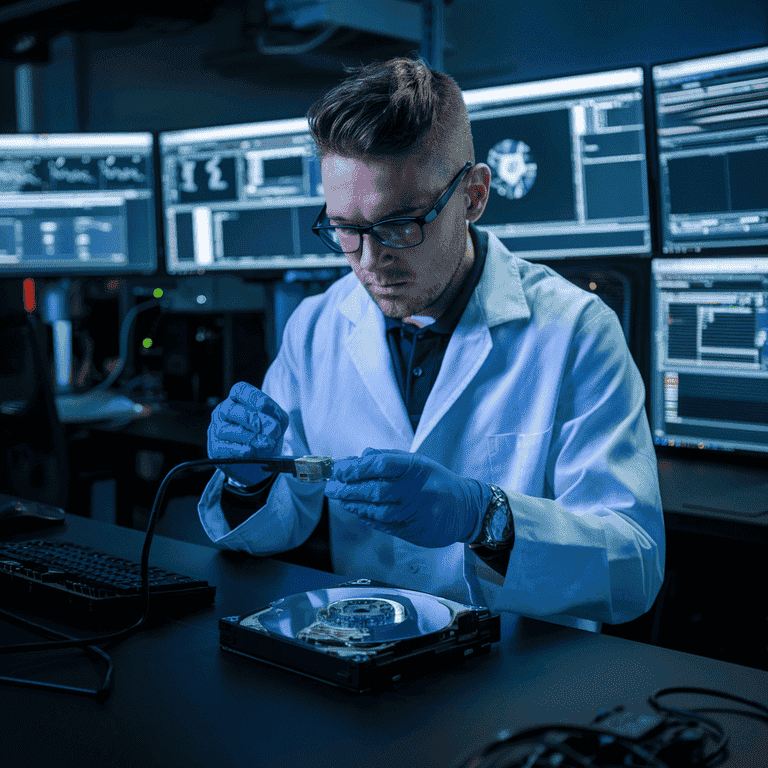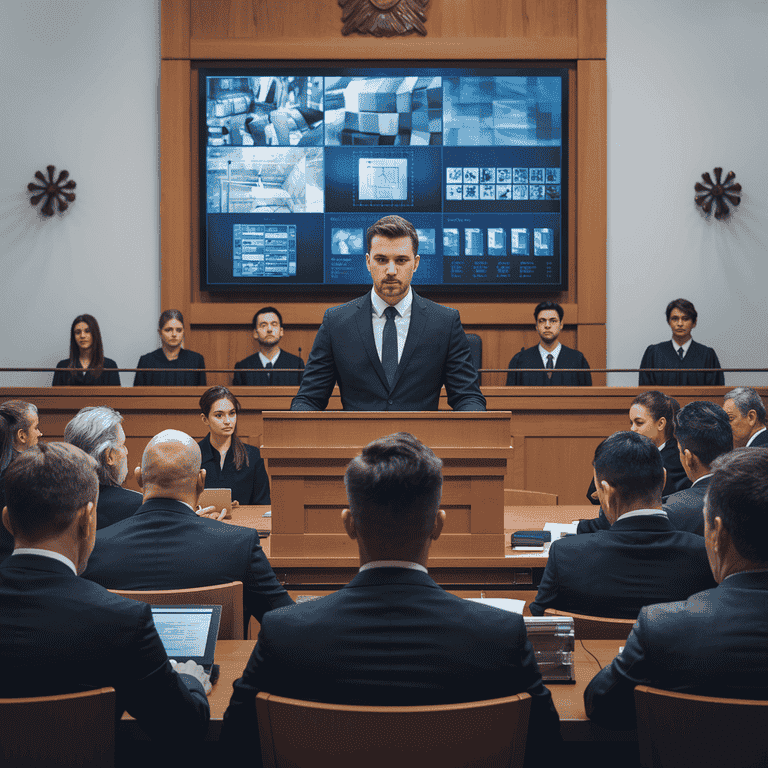Digital forensics is no longer just a technical niche; it’s a vital element in today’s criminal cases. In Nevada, where technology plays a significant role in daily life, the importance of digital evidence continues to grow.
From text messages to GPS data, digital evidence can shape the outcome of criminal cases. But what exactly is digital forensics? Why is it so important? This guide will explore these questions and provide an in-depth look at how digital forensics impacts criminal defense in Nevada.
Understanding the process, tools, and challenges will give you insights into how this field can affect your legal rights and case outcomes.
What Is Digital Forensics?
Understanding Digital Forensics
Digital forensics refers to the process of identifying, collecting, analyzing, and preserving digital data for use in legal cases. Unlike traditional evidence, digital evidence resides on electronic devices like smartphones, computers, or smart home gadgets.
The primary goal? To uncover and present data that supports legal investigations and court cases. Think of it as a detective’s toolkit for the digital world.
Key aspects of digital forensics include:
- Preservation: Ensuring the integrity of evidence.
- Analysis: Extracting meaningful insights from data.
- Presentation: Communicating findings in a courtroom-friendly manner.
Branches of Digital Forensics
Digital forensics encompasses several specialized areas, each focusing on different types of devices and networks.
| Branch | Focus | Examples |
|---|---|---|
| Computer Forensics | Data stored on computers or laptops. | Hard drives, deleted files, browser history |
| Mobile Forensics | Information from mobile devices. | Texts, call logs, app data |
| Network Forensics | Monitoring and analyzing network traffic. | Packet data, IP tracking |
| Cloud Forensics | Investigating data stored on cloud platforms. | Google Drive, Dropbox data |
| IoT Forensics | Examining data from smart devices. | Smart thermostats, fitness trackers |
Each branch serves a specific purpose, and cases often involve multiple types of digital evidence.
The Role of Digital Forensics in Criminal Cases
Types of Crimes Involving Digital Evidence
Digital forensics isn’t just for cybercrimes. While hacking and identity theft are typical examples, digital evidence also plays a role in traditional crimes.
Examples include:
- Cybercrimes: Hacking, phishing scams, and identity theft.
- Traditional Crimes: Using phone GPS to verify an alibi in an assault case or tracking financial fraud through emails.
- Child Exploitation: Digital forensics uncovers illegal content or online grooming behavior.
How Digital Forensics Supports Criminal Defense
Digital evidence isn’t always used against defendants. It often plays a crucial role in building their defense. Here’s how:
- Establishing Alibis: GPS or social media timestamps can prove a defendant’s location.
- Challenging Evidence: Identifying errors in how evidence was collected or analyzed.
- Highlighting Chain of Custody Issues: If digital evidence isn’t handled correctly, its validity can be questioned.
For example, a text message allegedly sent by a defendant could have been altered or misattributed. A skilled defense team uses digital forensics to challenge such claims.

Nevada Laws and Digital Evidence
Digital Evidence and Nevada Criminal Statutes
Digital evidence plays a pivotal role in criminal cases, but not all evidence is treated equally. Nevada’s laws establish clear rules for what is admissible in court. If evidence doesn’t meet these standards, it may be excluded, which can significantly affect the outcome of a case.
Here’s what you need to know about how digital evidence is handled under Nevada law:
- Relevance: The evidence must directly relate to the crime or defense. For example, a GPS log showing a defendant’s location during a crime is considered relevant.
- Authenticity: The evidence must be proven to be genuine. A digital forensic expert may need to verify that a text message hasn’t been altered.
- Hearsay Exceptions: Certain digital communications, like emails or texts, may be admitted under hearsay exceptions if they meet specific criteria.
Courts in Nevada carefully evaluate these factors before admitting digital evidence. Defense attorneys often focus on challenging one or more of these elements to weaken the prosecution’s case.
Privacy Laws and Digital Forensics
Both federal and state privacy laws protect Nevada residents. These protections directly affect how digital evidence is collected and used.
Rights Against Unlawful Search and Seizure
The Fourth Amendment of the U.S. Constitution prohibits unlawful searches and seizures. In Nevada, this means that law enforcement must usually obtain a warrant before accessing digital devices like:
- Smartphones
- Computers
- Email accounts
- Social media profiles
If evidence is collected without a warrant, it may be considered inadmissible in court. This is called the exclusionary rule, a powerful tool for defense attorneys.
Key Nevada Statutes on Digital Privacy
Nevada has its privacy laws that supplement federal protections. Notable statutes include:
- NRS 205.4765: Covers unauthorized access to computer systems and related penalties.
- NRS 200.604: Prohibits unlawful recording of communications, such as phone calls or video chats.
Understanding these laws helps ensure that digital evidence is collected legally and ethically.
The Digital Forensics Process
Key Steps in Digital Evidence Investigation
Digital forensics involves precise steps to ensure evidence is valid and usable in court. Each step is designed to preserve the integrity of the data while uncovering valuable insights.
- Identification: Experts determine what digital evidence is relevant. This could include emails, hard drives, or mobile data.
- Collection: Evidence is carefully gathered to avoid altering the original data. For example, a hard drive’s forensic image (an exact copy) is created to preserve its state.
- Preservation: Special tools ensure evidence is stored securely to prevent tampering. Chain of custody protocols are followed to track who handles the evidence.
- Analysis: Data is examined using specialized software to uncover critical details. This might involve recovering deleted files or tracing network activity.
- Reporting: Findings are compiled into a report that can be presented in court. This report must be clear and understandable, even for non-technical audiences.
Example of a Digital Forensics Workflow
| Step | Description | Example |
|---|---|---|
| Identification | Pinpoint relevant devices or accounts. | Defendant’s phone and email logs. |
| Collection | Securely extract data without altering it. | Imaging the phone’s storage. |
| Preservation | Store evidence to maintain its integrity. | Encrypted hard drive storage. |
| Analysis | Use tools to analyze the data for insights. | Recovering deleted messages. |
| Reporting | Present findings in a clear, legal format. | Report on message timestamps. |
Tools and Techniques Used in Digital Forensics
Digital forensics relies on advanced tools to extract and analyze data. These tools ensure accuracy and reliability, which are critical for evidence presented in court.
Hardware Tools
- Write Blockers: Prevent accidental changes to the original device during data extraction.
- Forensic Imaging Devices: Create exact replicas of hard drives or other storage.
Software Tools
- Forensic Analysis Platforms: Programs like FTK (Forensic Toolkit) and EnCase allow experts to sift through vast data efficiently.
- Specialized Tools: Applications for recovering deleted files or analyzing metadata.
These tools allow experts to uncover critical evidence while preserving its integrity for court proceedings.

Challenges in Digital Forensics
Common Issues with Digital Evidence
Digital forensics is a powerful tool, but it’s not without challenges. When dealing with digital evidence, experts often encounter obstacles that complicate investigations and legal proceedings.
Encryption and Password-Protected Data
Encryption is designed to protect data, and it does its job well. While this is great for personal privacy, it can be a significant hurdle in criminal cases.
- Challenge: Forensic experts may need weeks—or even months—to crack encrypted files. In some cases, the encryption may be impossible to break.
- Impact: Critical evidence may remain hidden without access to encrypted data.
Data Volume and Complexity
Modern devices store enormous amounts of data. A single smartphone can hold thousands of texts, emails, photos, and files, and sorting through them can be overwhelming.
- Challenge: Sifting through massive datasets to find relevant information.
- Impact: This can delay investigations and create additional costs for legal teams.
Chain of Custody Errors
Maintaining a proper chain of custody is critical. Any break in the chain can lead to questions about the evidence’s authenticity.
- Challenge: If evidence isn’t carefully tracked, it may be considered tampered with.
- Impact: Defense attorneys can use these errors to challenge the validity of the evidence.
Table of Common Digital Forensics Challenges
| Challenge | Description | Potential Consequences |
|---|---|---|
| Encryption and Passwords | Protects data but complicates investigations. | Evidence remains inaccessible. |
| Data Volume and Complexity | Devices store large amounts of data. | Investigations take longer. |
| Chain of Custody Errors | Mishandling evidence breaks its authenticity. | Evidence may be thrown out in court. |
Legal and Ethical Challenges
The use of digital evidence raises essential legal and ethical questions. While technology is powerful, it must be used responsibly.
Privacy Concerns in Digital Investigations
Digital forensics often involves accessing highly personal information, such as:
- Private emails
- Photos
- Social media accounts
This creates a tension between solving crimes and respecting individual privacy. In Nevada, improperly obtained evidence can lead to serious legal repercussions, including evidence being ruled inadmissible.
Ethical Considerations for Forensic Experts
Forensic experts must adhere to strict ethical guidelines, such as:
- Remaining impartial during investigations.
- Avoiding overreach when collecting data.
For example, if an expert accesses data beyond what the warrant allows, it can jeopardize the entire case.

Importance of Digital Forensics Experts in Nevada Cases
Role of Experts in Criminal Defense
Digital evidence can be complex. That’s why skilled forensic experts are critical to a strong defense. They bring the technical knowledge needed to interpret and challenge digital proof effectively.
How Experts Support Defense Attorneys
- Evaluating Evidence: Experts can verify whether evidence was collected and handled correctly.
- Uncovering Errors: If mistakes were made during the forensic process, they can expose them.
- Explaining Findings: In court, experts translate technical jargon into language that juries and judges can understand.
Testifying as Expert Witnesses
In Nevada criminal cases, expert witnesses often play a pivotal role. Their testimony can:
- Explain the technical aspects of digital evidence.
- Highlight weaknesses in the prosecution’s case.
A compelling expert witness can distinguish between a guilty verdict and an acquittal.
Qualities to Look for in a Digital Forensics Expert
Not all experts are created equal. Choosing the right forensic expert is crucial for building a strong defense.
Key Qualifications
- Certifications: Look for industry-recognized credentials like Certified Computer Examiner (CCE) or EnCase Certified Examiner (EnCE).
- Experience: The expert should have a proven track record with cases similar to yours.
Why Local Expertise Matters
Hiring a Nevada-based expert can be especially beneficial. They’ll have a deeper understanding of state laws and how digital evidence is handled in Nevada courts.
What to Look For | Why It Matters |
Industry Certifications | Proves technical expertise. |
Experience with Nevada Cases | Familiarity with state-specific laws. |
Strong Communications Skills | Ability to explain evidence clearly. |
Practical Applications in Nevada Criminal Cases
Digital Evidence in Specific Case Types
Digital forensics applies to a wide range of criminal cases. Each type of case leverages digital evidence in unique ways.
Examples of Digital Evidence by Case Type
- Social Media Evidence
- Posts, messages, and activity logs can show intent or provide an alibi.
- GPS and Location Data
- Proves a defendant’s presence—or absence—at a crime scene.
Using Social Media in Defense
Social media accounts are often a goldmine of evidence. For example:
- A defendant’s Facebook posts may show they were miles from the alleged crime scene.
- However, timestamps can be faked. This is where digital forensic experts come in, verifying the authenticity of the data.
Building a Strong Defense with Digital Forensics
Using digital forensics effectively can strengthen a defense strategy.
Steps to Leverage Digital Evidence
- Collaborate Early: Involve forensic experts to analyze the evidence thoroughly as soon as possible.
- Challenge Collection Methods: Ensure all evidence was collected legally and ethically.
- Highlight Weaknesses: Use forensic findings to question the prosecution’s case.
Real-Life Example
In one Nevada case, GPS data retrieved from a defendant’s car proved they were at home during the alleged crime. This evidence was critical in securing an acquittal.

Breaking It All Down
Digital forensics has transformed the way evidence is handled in criminal cases. In Nevada, it plays a critical role in both prosecution and defense. From encrypted emails to GPS data, digital evidence offers a deeper look into a case’s details. However, it also raises challenges, including privacy concerns, data complexity, and the risk of mishandling evidence.
For defendants, the right digital forensics expert can make all the difference. They help uncover errors, challenge evidence collection, and clarify technical findings for the court. In a world where digital devices are part of everyday life, understanding and leveraging this evidence is essential for building a strong legal defense.

Frequently Asked Questions
How does digital forensics differ from traditional evidence collection?
Digital forensics focuses on electronic data, such as emails, text messages, and GPS logs, rather than physical evidence like fingerprints or DNA. The methods used to collect, analyze, and preserve digital evidence are highly specialized and require advanced technology.
Can social media posts be used as evidence in court?
Yes, social media posts are often admissible in court. They can provide insights into a defendant’s activities, relationships, or intent. However, their authenticity must be verified by a digital forensics expert to ensure they haven’t been altered.
What is metadata, and why is it essential in digital forensics?
Metadata is hidden information within digital files that reveals the date a file was created, modified, or accessed. It’s critical in investigations because it can establish timelines or prove whether evidence has been tampered with.
Are text messages considered reliable evidence?
Text messages can be reliable evidence if they are correctly collected and authenticated. However, challenges like spoofed messages or incomplete records may affect their credibility, making expert analysis essential.
Can digital forensics recover data from damaged devices?
In many cases, yes. Forensic tools can often retrieve data from physically damaged devices, such as a cracked phone or a water-damaged hard drive. Success depends on the extent of the damage and the tools used.
How long does it take to analyze digital evidence?
The time required varies widely depending on the case’s complexity and the data volume. Simple cases take a few days, while complex ones with encrypted files or vast amounts of data can take weeks or months.
What are hash values, and why do they matter in digital forensics?
Hash values are unique digital fingerprints for files. They ensure the integrity of evidence by proving that a file hasn’t been altered during the forensic process. Any change to the file alters its hash value, making tampering detectable.
Can law enforcement access cloud data without a warrant?
Generally, no. Accessing cloud data without a warrant violates privacy laws. However, service providers may be compelled to hand over data with proper legal authorization.
What happens if evidence is collected outside the scope of a warrant?
Evidence collected beyond the warrant’s scope may be deemed inadmissible in court. A defense attorney can argue that such evidence violates the Fourth Amendment and should be excluded from the trial.
What types of experts are involved in digital forensic investigations?
Beyond digital forensic specialists, cases often involve network engineers, software developers, and cybersecurity experts who provide insights into specific aspects of the data.
How can smart devices contribute to digital evidence?
Smart devices like fitness trackers, smart home systems, or voice assistants can provide data about a defendant’s activities, locations, and interactions. For example, a fitness tracker might show movement patterns during a crime.
What is steganography, and how does it relate to digital forensics?
Steganography involves hiding data within other files, such as embedding a secret message in an image. Digital forensic tools can uncover and analyze these hidden messages, which might be crucial in some instances.
Can forensic experts detect edited or fake digital evidence?
Yes, forensic experts use tools to identify signs of manipulation, such as inconsistencies in metadata, pixel anomalies in images, or irregularities in file structures. This ensures that only authentic evidence is considered.
What should I do if I suspect digital evidence against me has been manipulated?
Immediately inform your attorney. They can engage a digital forensic expert to analyze the evidence, identify tampering, and present findings in your defense.
Are there limitations to what digital forensics can uncover?
While digital forensics is powerful, it isn’t infallible. Data that are overwritten or encrypted with unbreakable algorithms may remain inaccessible. Additionally, human error in evidence handling can limit what can be effectively analyzed.
Can old devices still provide usable evidence?
Yes, even older devices can hold valuable evidence. Digital forensic tools can extract data from outdated operating systems and hardware, making them relevant in ongoing cases.
What is a forensic image, and why is it important?
A forensic image is an exact copy of a digital device’s storage. It’s essential because it allows experts to analyze data without altering the original evidence, preserving its integrity for court proceedings.
How can digital forensics impact plea negotiations?
Strong digital evidence—supporting or challenging a case—can influence plea negotiations by strengthening a defense or exposing weaknesses in the prosecution’s argument. This can lead to more favorable terms for the defendant.

Additional Resources for You from The Rosenblum Allen Law Firm.
Here are the additional resources created by our lead attorney, Molly Rosenblum Allen, Esq., each with a brief description to guide you:
Criminal Defense Attorneys
If you’re facing criminal charges, our criminal defense attorneys provide effective representation. They offer a thorough defense to protect your rights and help you navigate the legal system.Las Vegas DUI Lawyer
A DUI charge can have serious consequences. Our Las Vegas DUI lawyers specialize in defending clients charged with driving under the influence, ensuring you receive the best possible outcome.Domestic Violence Lawyer Las Vegas
If you’re involved in a domestic violence case, we offer experienced legal representation to protect your rights, whether you’re the alleged victim or the accused.Drug Possession Lawyer
Facing drug possession charges? Our skilled drug possession lawyers can help build a strong defense, potentially reducing or eliminating penalties.Sex Crimes Attorney
Charges related to sex crimes are serious and require a lawyer with experience in defending such cases. Our attorneys are here to ensure your rights are protected throughout the process.CPS Defense Attorney
If you are facing accusations of child abuse or neglect, our CPS defense attorneys are committed to defending your parental rights and protecting your family’s future.Misdemeanor Lawyer
Misdemeanor charges may seem minor, but they can still lead to significant consequences. Our misdemeanor lawyers work to minimize penalties and defend your reputation.Las Vegas Warrant Defense Attorney
If you have a warrant out for your arrest, our Las Vegas warrant defense attorneys can assist in handling the matter efficiently and work toward clearing your name.Las Vegas Probation Violation Attorney
Violating probation can lead to severe consequences. Our probation violation attorneys will help you understand your options and defend your case to avoid harsher penalties.Theft Crime Defense Lawyer
Whether it’s shoplifting, burglary, or grand theft, our theft crime defense lawyers specialize in providing strong defense strategies to protect you from theft-related charges.Kidnapping Lawyers
Kidnapping charges carry serious penalties. Our kidnapping lawyers are experienced in handling such sensitive and complex cases, working hard to ensure the best defense.Juvenile Defense Lawyers
If your child is facing criminal charges, our juvenile defense lawyers focus on protecting their future by guiding them through the juvenile justice system with care and experience.Firearms Lawyer Las Vegas
Whether you’re dealing with illegal possession, trafficking, or misuse of a firearm, our firearms lawyers in Las Vegas provide skilled defense to protect your rights.
Each of these services has been created to help guide and defend you during some of the most challenging times. Feel free to explore these links to learn more about the effective legal assistance available to you.

Offsite Resources for You
American Translators Association – www.atanet.org
A comprehensive resource for professional translators, offering certification, tools, and resources for anyone interested in translation services.
ProZ.com – www.proz.com
A platform where professional translators and clients connect, offering forums, job postings, and resources for legal translation professionals.
Globalization and Localization Association – www.gala-global.org
GALA supports professionals in translation and localization, with resources and networking opportunities for those involved in legal translation work.
The Institute of Translation and Interpreting – www.iti.org.uk
A professional body for translators and interpreters, offering accreditation, education, and resources for legal translators.
National Association of Judiciary Interpreters and Translators – www.najit.org
A valuable resource for translators and interpreters specializing in legal proceedings, with tools and information on court-related translation needs.
AI for Good Foundation – www.aiforgood.org
A nonprofit that promotes the use of artificial intelligence to benefit society, including applications in translation and legal technologies.
Global Translations – www.globaltranslations.com
Specializing in translation and localization services, Global Translations offers expertise in legal translation and other industries, providing access to a range of language services.

A Special Message from Our Lead Attorney, Molly Rosenblum Allen, Esq

Thank you for taking the time to explore our resources. I hope you found them helpful and informative as you navigate your legal concerns. At The Rosenblum Allen Law Firm, we’re here to provide the guidance and support you need.
If you’re ready to discuss your case, I’d like to personally invite you to schedule a free consultation. Please don’t hesitate to reach out by calling us at (702) 433-2889. We’re here to help and look forward to speaking with you.
Warm regards,
Molly Rosenblum Allen, Esq.






